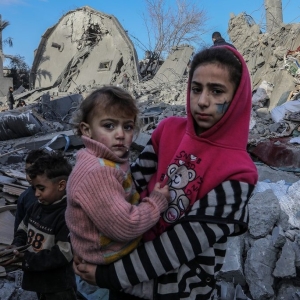
.jpg) Aakash
Aakash

The International Court of Justice, the top court of the United Nations, located in the Hague, Netherlands, on January 26, gave out a ruling that many have touted as a landmark. It offers the first hope of protecting civilians from genocide, sweeping destruction, inhuman conditions and further trauma. The ruling identifies the current situation and acknowledges the decades of Palestinian struggle.
The war between Israel and Hamas began with Hamas' invasion of Israel on October 7, 2023, where they killed over 1,200 people, injured thousands and abducted around 240 people, many of whom are still in captivity. The State of Israel launched a large-scale military offensive in Gaza in retaliation by land, air and sea. It had claimed over 28,000 lives (about 26,600 Palestinians and 1,400 Israelis) by the end of January. As days passed, the offensive garnered attention worldwide, with some in agreement and most against it.
South Africa, on December 29, 2023, filed the application instituting proceedings against Israel concerning alleged violations in the Gaza Strip of obligations under the Convention on the Prevention and Punishment of the Crime of Genocide. Before filing its application, South Africa repeatedly and urgently voiced its concerns in public statements and various multilateral settings, including the United Nations Security Council and General Assembly, that Israel's actions in Gaza amount to genocide against the Palestinian people. It asserted that the response to the initial attack by Hamas was unlawful and that the Israelite leadership must be investigated for war crimes and genocide as they acted with the intent to destroy or displace all Palestinians in Gaza.
Israel vehemently rejected all claims of genocidal intent and claimed that it was Hamas which was putting the civilians in harm's way. It says Hamas operates inside and underneath Gaza's densely populated towns and refugee camps, making it virtually impossible for Israel to avoid killing civilians and that it has gone to great lengths to warn civilians to prevent danger. During oral hearings in January, it further requested the case be dismissed and removed from the General List—a motion that was rejected.
The court observed that some of Israel's acts and omissions amounting to genocide, as alleged by South Africa, could stand ground and could fall within its jurisdiction within the provisions of the Genocide Convention. Supposedly, in recognition of Israel's right to defend itself in the wake of the Hamas attacks, the ICJ stopped just short of ordering a ceasefire, a key request in South Africa's application. The court recognises that the situation is catastrophic and precariously perched on the border of rapid deterioration.
The ruling could be consequential as it one-ups the US officials, who derided South Africa's case as "meritless, counterproductive, and completely without any basis in fact whatsoever." South Africa has effectively brought Israel and the Western narrative of rules-based order to the dock. Had the court dismissed the application, it would only have strengthened the view that the ICJ is only a tool for the Western powers to dominate and punish those against it under the veil of justice.
As a result, it made several demands of Israel, broadly in line with most of the nine "provisional measures" demanded by South Africa. The ICJ issued six provisional measures, ordering Israel to take all measures to prevent acts of genocide. Most of the court's 17 judges ruled that Israel should do everything in its power to avoid killing Palestinians, causing them serious bodily or mental harm, creating intolerable living conditions in Gaza, or deliberately preventing Palestinian births. It also said Israel should do more to "prevent and punish" public incitement to genocide, citing examples by Israel's president and defence minister. It also called for "immediate and effective measures" to address the humanitarian catastrophe in Gaza. It has provided a month of grace for Israel to report back on its actions. The series of calls to action, if implemented, could drastically change the nature of Israel's military campaign in Gaza. Algeria, a non-permanent member of the UN Security Council, has requested a council meeting to enforce the ICJ ruling regarding Israel.
Tel Aviv and Washington have not responded well to the court's verdict. While Israeli Prime Minister Benjamin Netanyahu said the ICJ's decision to proceed with the case was "outrageous" and that Israel would continue to defend itself, Biden has withdrawn the nominal aid that it was contributing to the UN Relief and Work Agency for Palestinian refugees citing the flimsy Israel's allegation that some of the UN's staff was implicated in the October 7 attacks.
However, two camps have emerged in reaction to this ICJ ruling. One group has hailed the court's decision as a watershed moment. Israel has been finally held accountable after decades for the litany of outrages it has committed against generations of Palestinians. The court's sentence implies that Israel's freedom to kill, backed by the West, is removed.
The other group, predominantly the Palestinians and their supporters, described the court's refusal to demand a ceasefire and halt Israel's latest invasion as a predictable "failure" that has only fuelled their abiding mistrust of the "international community" and the so-called "global justice system". While they did not expect the application to amount to anything, even the thin veneer of hope they held on to was broken for them.
Though the ICJ has accepted that injustice is being perpetrated, it will be a long time, even years, before a final verdict is proclaimed and its perpetrators brought to task. In the meantime, the "war" will persist, and the people continue to suffer. If found culpable, Israel will no longer be the victim of European history but will have to carry the plaque of ignominy as the villain. It might be too late by then, as Gaza and its memory will have been turned to dust.